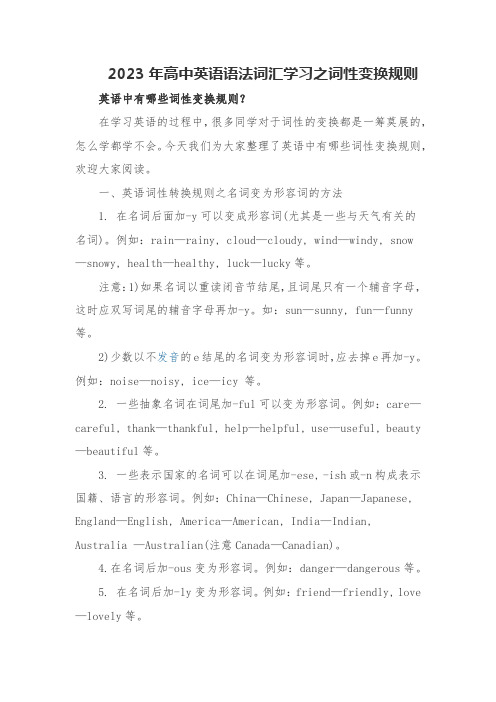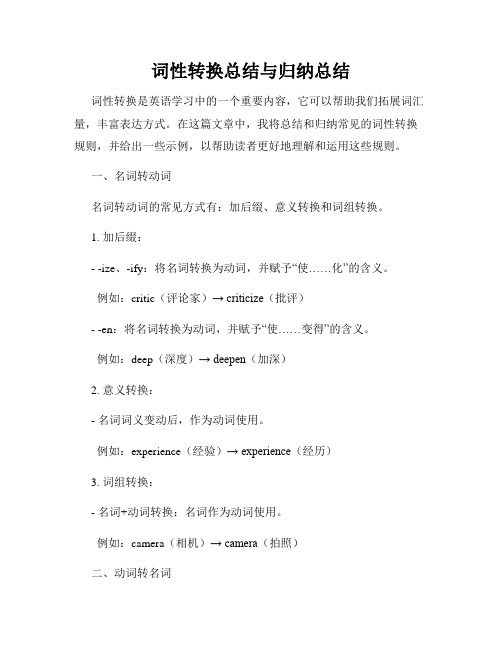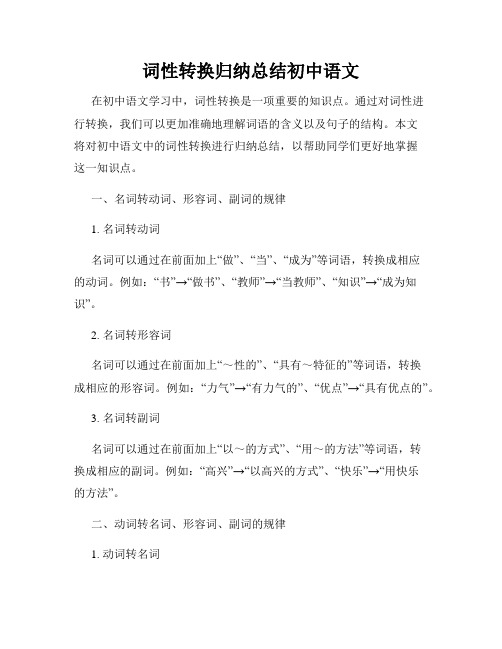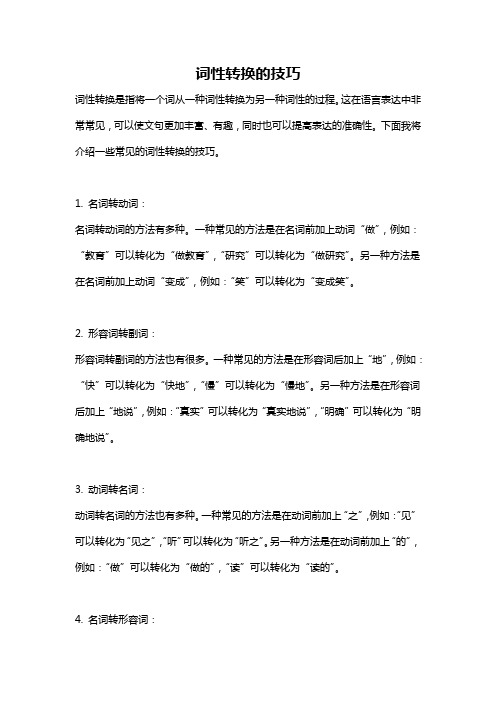词性转换规律
2023年高中英语语法词汇学习之词性变换规则

2023年高中英语语法词汇学习之词性变换规则英语中有哪些词性变换规则?在学习英语的过程中,很多同学对于词性的变换都是一筹莫展的,怎么学都学不会。
今天我们为大家整理了英语中有哪些词性变换规则,欢迎大家阅读。
一、英语词性转换规则之名词变为形容词的方法1. 在名词后面加-y可以变成形容词(尤其是一些与天气有关的名词)。
例如:rain—rainy, cloud—cloudy, wind—windy, snow —snowy, health—healthy, luck—lucky等。
注意:1)如果名词以重读闭音节结尾,且词尾只有一个辅音字母,这时应双写词尾的辅音字母再加-y。
如:sun—sunny, fun—funny 等。
2)少数以不发音的e结尾的名词变为形容词时,应去掉e再加-y。
例如:noise—noisy, ice—icy 等。
2. 一些抽象名词在词尾加-ful可以变为形容词。
例如:care—careful, thank—thankful, help—helpful, use—useful, beauty —beautiful等。
3. 一些表示国家的名词可以在词尾加-ese, -ish或-n构成表示国籍、语言的形容词。
例如:China—Chinese, Japan—Japanese, England—English, America—American, India—Indian,Australia —Australian(注意Canada—Canadian)。
4.在名词后加-ous变为形容词。
例如:danger—dangerous等。
5. 在名词后加-ly变为形容词。
例如:friend—friendly, love —lovely等。
6.在名词后加-less构成含有否定意义的形容词。
例如:care—careless(粗心的),use—useless(无用的),hope—hopeless(没希望的),home—homeless(无家可归的)等。
2025届高考英语专题复习之考纲词汇词性转换规律课件

devote→devodteiosnc;rippotlilounte→________; contribute→____________;
revise→________________;5. +ion act→poalclutitoino;nattract→__________;
protect→___c_o_n__tr_i_b_u;tsiougngest→_____re__v_is_i_o_n____;注意
rich→ __enrich_________courage→ _________ ;danger→ _________ ;
V/n变人的名词
1. +er/r sing→ singer; teach→___teacher_____; strange→___stranger___; 2. +or act→ actor; invent→ _inventor____; educate→educater_________; 3. +ee employ→___employee___(雇员); interview→___________(被采访者; 参加面试者); 4. +(r)ess act→ actress; wait→__waitress______; host→________; 注意 god→___goddess_____5. +ese Japan→ _________; Vietnam→___________注意 China→ ________; 6. +n Asia→ Asian; America→__________; Australia→___________; 7. (去y或s) +ian music→ musician; history→_________; library→_________;
词性转换总结与归纳总结

词性转换总结与归纳总结词性转换是英语学习中的一个重要内容,它可以帮助我们拓展词汇量,丰富表达方式。
在这篇文章中,我将总结和归纳常见的词性转换规则,并给出一些示例,以帮助读者更好地理解和运用这些规则。
一、名词转动词名词转动词的常见方式有:加后缀、意义转换和词组转换。
1. 加后缀:- -ize、-ify:将名词转换为动词,并赋予“使……化”的含义。
例如:critic(评论家)→ criticize(批评)- -en:将名词转换为动词,并赋予“使……变得”的含义。
例如:deep(深度)→ deepen(加深)2. 意义转换:- 名词词义变动后,作为动词使用。
例如:experience(经验)→ experience(经历)3. 词组转换:- 名词+动词转换:名词作为动词使用。
例如:camera(相机)→ camera(拍照)二、动词转名词动词转名词的主要方式有:加后缀、意义转换和短语转换。
1. 加后缀:- -tion、-ation、-ment:将动词转换为名词,并赋予“……的行为、状态或结果”的含义。
例如:experience(经历)→ experience(经验)2. 意义转换:- 动词词义变动后,作为名词使用。
例如:swim(游泳)→ swim(游泳运动)3. 短语转换:- 动词+名词转换:动词作为名词使用。
例如:run(奔跑)→ run(竞选)三、形容词转副词形容词转副词的常见方式是:加后缀。
1. 加后缀:- -ly:将形容词转换为副词。
例如:quick(快速的)→ quickly(快速地)四、副词转形容词副词转形容词的方式主要是:移出后缀和意义转换。
1. 移出后缀:- 副词的-ly后缀去掉后,即变为形容词。
例如:beautifully(优美地)→ beautiful(美丽的)2. 意义转换:- 副词的词义变动后,作为形容词使用。
例如:fast(快速地)→ fast(快的)五、形容词转名词形容词转名词的方式主要是:加不定冠词或定冠词。
词性转换规律课件

“happiness”转换为“to happiness”(去掉后缀)
“truth”转换为“to truth”(词根变形)
名词转换为动词后,词义可能会产生变化,需要仔细辨别。
注意词义的变化
名词转换为动词后,需要确保在语境中适用,避免使用不当。
注意语境的适应性
名词转换为动词后,需要确保语法的正确性,避免出现语法错误。
注意词性转换后的语义是否产生变化,如“kind”作为形容词表示“善良的”,作为名词表示“种类”。
注意词性转换后的语法功能是否产生变化,如“happy”作为形容词可以修饰名词,而“happiness”作为名词不能修饰名词。
副词转换为名词
01
02
副词以其他情势结尾,直接添加相应的名词后缀。
副词以“-ly”结尾,去掉“-ly”后,添加相应的名词后缀。
注意语法的正确性
动词转换为名词
01
02
04
03
有些动词转换为名词后,词义会产生改变,需要特别注意。
注意词义的变化
有些动词转换为名词后,发音会产生改变,需要注意 Nhomakorabea音的准确性。
注意发音的变化
有些动词转换为名词后,拼写会产生改变,需要注意拼写的准确性。
注意拼写的变化
形容词转换为名词
形容词以“-ness”、“-ity”等结尾,可以转换为名词。
词性转换规律课件
目录
CONTENTS
词性转换基本概念名词转换为动词动词转换为名词形容词转换为名词副词转换为名词
词性转换基本概念
词性转换是指将一个词的词性转换为另一种词性的语言现象。
词性转换是指同一个词在不同的语境或句子中,可以表示不同的词性。例如,“快乐”可以是形容词,也可以作为名词表示快乐的状态。
(完整版)词性转换常见规律归纳

动词变名词1.v+ ment 结尾achieve---achievement 成就advertise---advertisement advertisingagree— agreementargue---argument争吵announce --- announcement 通知amuse--- amusement 娱乐commit奉献—commitment develop---development disgree—disagreementequip装备---equipment装备,器材govern 统治—government 政府manage---management 经营管理settle--- settlement 定居2.V+ tion 结尾以t, te, de, 结尾的动词常去E 或直接加ion admit 承认—admissionattract吸引—attraction 有吸引力的事或人;令人向往的地方conclude—conclusion 结论compete—competition竞争,比赛discuss—discussion 讨论educate-----educationdecide----decision describe—description描写,描绘organize----organization imagine—imagination 想象力introduce—introduction 介绍instruct—instruction 指导,介绍invent—inventor / invention illustrate 阐明,举例说明--illustrationinvite—invitationinspire---inspiration 灵感,鼓舞人心的pollute----pollution 污染predict---prediction 预言pronounce ---pronunciation resolve 决心-----resolution 决心impress 给人印象—impression 印象permit 允许-----permission suggest-建议,暗示--suggestion solve解决-----solution 解决方法3.V+ ance 结尾allow—allowance 允许appear—appearance 外貌,出现perform----performance 演出exist—existance 存在4.V+ ing 结尾bathe 洗澡---bathingend 结束----ending 结尾,结局train 训练---training mean ---- meaning 意义say-----saying 谚语5.V+ 其他beg(乞讨)—beggar 乞丐sit--seat 座位employ--employer 雇主,老板--employee雇员believe—belief 信仰behave 行为,举止----behavior know---knowledgefly—flight 飞行heat 加热---heat 热量hit 撞击------hit 轰动一时的人或物,碰撞mix 混合-----mixture 混合物press 按,压—pressure 压力receive—receptionist 接待员serve—service 服务succeed-- successtour 在-----旅游- tourist 游客pursue—pursuit 追求,从事propose—proposal 建议withdraw—withdrawal 取钱;收回;撤退survive—survival--survivor 幸存者arrive-- arrival到达analyze—analysis 分析名词变形容词1名词+yanger 生气-----angry honest—honesty 诚实的hunger---hungry fog—foggy有雾的fur----furry 毛皮的guilt 罪恶---guilty 内疚的health---healthyluck---luckycloud---cloudy wind—windy rain---rainysnow---snowysun—sunnytourist------touristy 游客多的business---busysalt 盐--- salty 咸的shine---shiny 发亮的silk 丝绸—silky 丝绸般的sleep---sleepy 昏昏欲睡的taste 口味,品味------tasty 甜的2.名词+ edbalance –balanced 平衡的spot 斑点,地点----spotted 有斑点的talent-----talented 有天赋的organized 有组织的distusted 厌恶的offended 生气的crowded 拥挤的polluted 被污染的pleased 高兴的3.名词+ ful/lessmeaning—meaningful 有意义的care—careful/ careless 小心的;粗心的help---helpful / helplesshome—homeless 无家可归的colour---colourfulpain 疼痛---painful 痛苦的use---useless/ useful thank—thankful 充满感激的peace 和平---- peaceful 平静的,宁静的playful 顽皮的,爱玩耍的4.名词+ ableadjustable 可调整的comfort---comfortable knowledge---knowledgeable suit 一套-----suitable 合适的5.名词+ ous courage—courageous 勇敢的danger—dangerousmystery 神秘-----mysterious 神秘的6.ce 变t confidence----confident difference---different dependence—dependent independence--independent7. al 结尾Addition—additional 附加的,额外的Class—classical 经典的medicine 药----medical 医学的music---musicalnature---natural 自然的person---personal (私人的) nation—national 国家的education---educational有教育意义的tradition----traditional 传统的origin起源---original 新颖的;独创的grammar—grammatical 语法的globe—global 全球的8.名词+ lyfriend—friendlylive---lively 活跃的,有生气的love—lovely 可爱的9.+ en 结尾wood—wooden 木制的wool—woolen 羊毛的10. 其他energy精力---energetic strategy—strategic 战略的fool 傻子—foolish 愚蠢的freedom 自由—free 空的,免费的height 高度—high illness 疾病--- ill love—loving 慈爱的death---deadpleasure---pleasant / pleased popularity 流行性—popular pride---proudscientist----scientific 科学的形容词变副词1.形容词+ lybad—badlybright—brightly 明亮地casual—casually 随意地clear—clearly 清楚地complete—completely 完全correct---correctly 正确地final--finally fortunate—fortunately幸运地general—generally 一般来讲loud—loudlyparticular 特殊的,独特的—particularlypolite—politelyproper 合适的-,恰当的---properlymain------mainly 主要地most 多数-----mostly 多半,大多数normal---normally 正常地quick—quicklyquiet—quietly 轻轻地,安静地real—reallyrecent 最近的----recently 最近;近来hard 难的;努力地---hardly几乎不late 迟的—lately 最近;近来sad--sadlyslow---slowly special—specially 专门,特殊地specific---specifically特定地,明确地strong—strongly 坚决地,强烈地sudden—suddenly突然usual—usually2. 以le 结尾的去e + ycomfortable---comfortably gentle—gentlypossible---possibly simple ----simply 仅仅;只;简单地terrible---terribly3. 辅音字母+ y 变ilyeasy—easilyheavy—heavilyhappy--happily4.特殊good—well好地well 身体健康的,井true—truly形容词变名词efficient有效率的—efficiency 效率patient—patience/impatience dependent—dependenc依赖性independent—independency 独立性true—truth high—height wide—width long—lengthpossible—possibilityresponsible—responsibilityurgent—urgency 紧急prosperous—prosperity 繁荣accurate—accuracy 准确性形容词变动词modern—modernize social--socialize fast--fasten short/shorten long—lengthen—length(n.) wide--widen less--lessenstrong—strengthen—strength(n.)large—enlarge名词变动词computer--computerize名词---形容词—副词beauty 美,美人—beautiful—beautifully care—careful—carefully care—careless—carelessly difference---different---differently fortune—fortunate—fortunately/u nfortunately happiness—happy—happily hunger—hungry--hungrily health—healthy—healthily luck—lucky—luckily noise—noisy—noisily pride—proud—proudly骄傲地sadness—sad—sadlysafety 安全;安全的地方—safe —safelysilence—silent---silently 默默地success—successful—successfully truth—true—truly unluck—unlucky—unluckily wonder 奇迹—wonderful—wonderfully方位的词名词—形容词East—eastern West—westernSouth—southern North---northern In the west of ChinaIn the western part of China四大洲名词-----形容词Asia 亚洲–---- AsianAfrica 非洲----- AfricanEurope欧洲----- European America 美洲-----American既是形容词又是副词early get up early ;an early trainlate be late for classcome late for schooldeep dive deep into the seaa hole deep largehigh jump high;a high mountainhard a hard question;a hard stone work hard / study hardrain hardlong It takes too longIt takes a long timefar jump farMy home is far from school straight a straight linego straight along here。
词性转换归纳总结初中语文

词性转换归纳总结初中语文在初中语文学习中,词性转换是一项重要的知识点。
通过对词性进行转换,我们可以更加准确地理解词语的含义以及句子的结构。
本文将对初中语文中的词性转换进行归纳总结,以帮助同学们更好地掌握这一知识点。
一、名词转动词、形容词、副词的规律1. 名词转动词名词可以通过在前面加上“做”、“当”、“成为”等词语,转换成相应的动词。
例如:“书”→“做书”、“教师”→“当教师”、“知识”→“成为知识”。
2. 名词转形容词名词可以通过在前面加上“~性的”、“具有~特征的”等词语,转换成相应的形容词。
例如:“力气”→“有力气的”、“优点”→“具有优点的”。
3. 名词转副词名词可以通过在前面加上“以~的方式”、“用~的方法”等词语,转换成相应的副词。
例如:“高兴”→“以高兴的方式”、“快乐”→“用快乐的方法”。
二、动词转名词、形容词、副词的规律1. 动词转名词动词可以通过在后面加上“~的人”、“~的地方”等词语,转换成相应的名词。
例如:“读书”→“读书的人”、“写字”→“写字的地方”。
2. 动词转形容词动词可以通过在后面加上“~的”、“具有~特征的”等词语,转换成相应的形容词。
例如:“忍受”→“能忍受的”、“感动”→“具有感动特征的”。
3. 动词转副词动词可以通过在后面加上“以~的方式”、“用~的方法”等词语,转换成相应的副词。
例如:“高兴”→“以高兴的方式”、“快乐”→“用快乐的方法”。
三、形容词转名词、动词、副词的规律1. 形容词转名词形容词可以通过在后面加上“~的人”、“~的对象”等词语,转换成相应的名词。
例如:“聪明”→“聪明的人”、“美丽”→“美丽的对象”。
2. 形容词转动词形容词可以通过在前面加上“使得”、“让”、“将”等词语,转换成相应的动词。
例如:“干净”→“使得干净”、“光滑”→“让光滑”。
3. 形容词转副词形容词可以通过在后面加上“以~的方式”、“用~的方法”等词语,转换成相应的副词。
词性转换规律

-(at)ion. prediction adoption adaptation education reflection attraction action rejection consideration combination exploration publication imitation implication simplification creation relaxation fixation occupation starvation observation motivation impression expression depression
很可怕吗?
词性转换主要涉及n. v. adj. adv.转换及部分 pron. num. 的变形。
考察的是考纲基本词汇的变形。
应对策略: 基本词的派生要熟悉,多读。 了解词性派生的基本规律。
常见词性转换考法(语法填空和改错)
1. V.
n.
adj.
V.
2.Adj.
adv.
n.
Adj.Biblioteka v.useful harmful helpful colorful meaningful hopeful pitiful merciful careful
homeless endless jobless
变adj
-able 多加在动词后变能够...
acceptable suitable reliable adjustable adaptable adoptable unbelievable unforgettable unacceptable unpredictable honorable renewable
Energy/time-saving/consuming peace-loving longlasting easy-going good-looking
词性转换的技巧

词性转换的技巧词性转换是指将一个词从一种词性转换为另一种词性的过程。
这在语言表达中非常常见,可以使文句更加丰富、有趣,同时也可以提高表达的准确性。
下面我将介绍一些常见的词性转换的技巧。
1. 名词转动词:名词转动词的方法有多种。
一种常见的方法是在名词前加上动词“做”,例如:“教育”可以转化为“做教育”,“研究”可以转化为“做研究”。
另一种方法是在名词前加上动词“变成”,例如:“笑”可以转化为“变成笑”。
2. 形容词转副词:形容词转副词的方法也有很多。
一种常见的方法是在形容词后加上“地”,例如:“快”可以转化为“快地”,“慢”可以转化为“慢地”。
另一种方法是在形容词后加上“地说”,例如:“真实”可以转化为“真实地说”,“明确”可以转化为“明确地说”。
3. 动词转名词:动词转名词的方法也有多种。
一种常见的方法是在动词前加上“之”,例如:“见”可以转化为“见之”,“听”可以转化为“听之”。
另一种方法是在动词前加上“的”,例如:“做”可以转化为“做的”,“读”可以转化为“读的”。
4. 名词转形容词:名词转形容词的方法有多种。
一种常见的方法是在名词后加上“的”,例如:“困难”可以转化为“困难的”,“美丽”可以转化为“美丽的”。
另一种方法是在名词前加上“具有”,例如:“价值”可以转化为“具有价值的”,“特点”可以转化为“具有特点的”。
5. 副词转动词:副词转动词的方法也有多种。
一种常见的方法是在副词后加上动词“做”,例如:“迅速”可以转化为“迅速做”,“安静”可以转化为“安静做”。
另一种方法是在副词后加上动词“变成”,例如:“成形”可以转化为“变成成形”,“明亮”可以转化为“变成明亮”。
6. 状语转形容词:状语转形容词的方法也有多种。
一种常见的方法是在状语前加上形容词“是”,例如:“完全”可以转化为“是完全的”,“不可避免”可以转化为“是不可避免的”。
另一种方法是在状语前加上形容词“之”,例如:“明显”可以转化为“之明显”,“难以置信”可以转化为“之难以置信”。
- 1、下载文档前请自行甄别文档内容的完整性,平台不提供额外的编辑、内容补充、找答案等附加服务。
- 2、"仅部分预览"的文档,不可在线预览部分如存在完整性等问题,可反馈申请退款(可完整预览的文档不适用该条件!)。
- 3、如文档侵犯您的权益,请联系客服反馈,我们会尽快为您处理(人工客服工作时间:9:00-18:30)。
英语单词词性转换的基本规律
一、动词变名词
①词形不变,词性改变。
例如:work, study, water, plant等可以用作动词,也可以用作名词。
②一些动词在词尾加上-er或-or之后就变成了表示"某一类人"的名词。
注意:
1)以不发音的e结尾的动词,在词尾加-r。
例如:drive—driver, write—writer等。
2)以重读闭音节结尾,且末尾只有一个辅音字母的动词,应双写末尾的辅音字母,再加-er。
例如:run—runner, win—winner,begin—beginner等。
work—worker teach—teacher sing—singer jump—jumper play—player learn—learner visit—visitor invent—inventor
wait _ waiter
find _ finder
thrill _ thriller
write _ writer
drive _ driver
come _ comer
explore _ explorer
dance _ dancer
run _ runner
win _ winner
rob _ robber
③在动词词尾加ing变成名词
注意:方法与动词变为现在分词的方法相同例如:
meet—meeting, build—building, swim—swimming shop—shopping begin—beginning wash—washing draw ----drawing end ---ending begin ---beginning skate--- skating feel---- feeling say---saying, mean ----meaning, cross---- crossing surf ----surfing paint -----painting wait—waiting
④在动词词尾加上ment 变成名词
例如:achieve—achievement (成就) agree—agreement ⑤在词尾加ion 或去e加ion:
decide _ decision donate _ donation describe _ description produce _ production celebrate _ celebration pronounce _ pronunciation
decorate _ decoration
graduate _ graduation
frustrate - frustration
pollute _ pollution
contribute _ contribution
congratulate _
congratulation
educate _ education
appreciate _ appreciation operate _ operation invite _ invitation
discuss _ discussion
invent _ invention
attract _ attraction
⑥其他一些比较特殊的变化
know ---- knowledge please ---pleasure enjoy--- enjoyment practise--- practice die ---death succeed--- success weigh ---weight sit-- seat
change --chance enter --entrance
fly --flight
discover-- discovery appear-- appearance breathe-- breath
二、名词变形容词
①在名词后面加-y可以变成形容词(尤其是一些与天气有关的名词)
例如: rain—rainy, cloud—cloudy, salt —salty sleep—sleepy
注意:1)如果以重读闭音节结尾,且词尾只有一个辅音字母,这时应双写辅音字母再加"-y".如: sun—sunny, fun—funny, fog—foggy
2)少数以不发音的e结尾的名词变为形容词时,应去掉e再加"-y".
如: noise—noisy, ice—icy
②名词后面加-ed,以e结尾的直接加d,表示被动性的属性或特点.
talent—talented (有天赋的) use-used
please - pleased
unite - united
excite - excited
close - closed
relax - relaxed surprise - surprised, develop - developed interest - interested crowd - crowded pollute - polluted
③一些抽象名词在词尾加-ful可以变为形容词
use - useful care - careful, help - helpful, thank - thankful peace - peaceful, forget - forgetful, play - playful, succeed - successful, wonder - wonderful
④在名词后加-less构成含有否定意义的形容词
例如:care—careless, use—useless
hope—hopeless,home—homeless
⑤一些以-ce结尾的名词,把-ce改为-t变成形容词
例如: difference—different, silence—silent, confidence—confident ⑥在名词后加-ly变为形容词
例如: friend—friendly, love—lovely, live---lively
⑦在名词后加-ous变为形容词
例如: danger—dangerous humor—humorous
⑧名词后面加-al变为形容词
例如: music—musical; medicine—medical (这个比较特殊) educate - educational ⑨名词后面加-able变为形容词,如果以e结尾就去e再加"-able".
例如: adjust—adjustable 可调整的value—valuable有价值的
know - knowledgeable, enjoy - enjoyabe, suit - suitable
adjust - adjustable, comfort - comfortable
⑩名词后面加-en变成形容词
例如: wood—wooden 木制的wool—woolen 羊毛的
speak - spoken, break - broken
⑪一些表示国家的名词可以在词尾加-ese, -ish或-n构成表示国籍,语言的形容词例如:China—Chinese, England—English,
America—American, Australia —Australian
(注意Canada—Canadian)
⑫其它:
lose - lost,
fool - foolish,
live - lively / alive /living, sleep - sleepy / sleeping / asleep, wake - awake, taste - tasty
die - dead,
world - worldwide。
